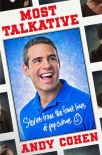Most Talkative: Stories From the Front Lines of Pop Culture by Andy Cohen (read people like a book .txt) 📗

- Author: Andy Cohen
Book online «Most Talkative: Stories From the Front Lines of Pop Culture by Andy Cohen (read people like a book .txt) 📗». Author Andy Cohen
Around that time I got a call from an exec at ABC Daytime who was developing a talk show about soaps and heard I might be the perfect producer. This seemed to me like potential kismet—Lucci and Cohen reunited at last. I knew I could produce that show, but that blind optimism told me I should try to take it to the next level. Why don’t I audition to host it? I thought. Who would be more perfect than me for this? I put the blank stares of CBS This Morning’s audience out of my mind and rushed out to make a demo tape of myself interviewing The Young and the Restless stars (whom I had access to, working at CBS) and sent it along. When I was called in to meet with the ABC Daytime producer I knew something big was about to happen for me. And my instincts were right, in a way. But instead of kvelling over my natural hosting skills and gorgeous, barely noticeably crossed eyes, she ripped into me for more than three minutes. And I quote: “How arrogant are you to think you could go from producing to being on-air with no experience? I’m in the business of making stars and the camera doesn’t lie and in your case it CERTAINLY didn’t lie.”
But did you like the tape!? I wondered.
Meanwhile, our new CBS This Morning format was such a dud that people just stopped showing up to sit in the audience. Within a couple weeks of our debut, there were days when we’d have just fifteen people in the studio. We made the interns come in early to fill the rows, and we’d seat whatever sad (and usually exhausted, bused-in) group (of senior citizens or sick people) we could find strategically, in a bunch, so Harry or Paula could stand in front of them and it would look to the home viewer like an actual crowd. Oh, by the way, you know what’s not made to be seen live on a stage? A morning show newsblock reporting on the latest in the Middle East or the weather report or a segment about consumer fraud. Fortunately, my pitiable routine must have been so unremarkable that no one upstairs caught wind of it, because one afternoon I got a call from a CBS exec offering me a producing job at 48 Hours. The show’s original incarnation was as a fly-on-the-wall documentary spotlighting various characters associated with one story for forty-eight hours. They called me because they were looking to expand into some celebrity-based shows and thought I’d be able to help. Eager to tackle something new, but also feeling a teensy bit like a rat leaving a sinking ship, I took the job and said a bittersweet good-bye to Harry, Paula, and the remaining fifteen audience members.
With Paula and Harry on my last day at CBS This Morning
In edit rooms and in the field at 48 Hours, I learned much that would later inform how I now give notes to the producers on Bravo shows. For instance, lingering on little moments—a facial expression, a tic, a swallowed word—can actually be far more revealing of someone’s character than the big moments. On Housewives, a wig-pulling episode is naturally provocative, but I’m just as intrigued by hearing what our subjects order at a meal. Ashley got the steak—?!! can become a vital thread in the overall tapestry. I worked on every kind of story at 48 Hours, including a segment on the original Broadway cast and production team behind Rent, a profile of Shirley MacLaine, and a piece about Barry Manilow’s relationship with his British fans, the Maniloonies. That last one was funny to everyone with the exception of Mr. Manilow and his fans. Our approach was: “Aww, look at these ladies of a certain age (and dimension) who call themselves Maniloonies, worshipping at the feet of Sir Barry.” They’d participated in the shoot willingly, but when it aired, they felt we were making fun of them, and Barry’s publicist was furious that we’d portrayed his audience as anything other than frenzied teenyboppers. The reaction didn’t surprise me. At Manilow’s concert, the publicist had repeatedly said, “Look at all the young people!” I looked around and didn’t see any, but I nodded anyway. We see what we want to see. Another story reunited me with my intern mama, Erin Moriarty, who’d long since left Morning Consumerville for a gig in prime time. At a booksellers’ convention, I’d been handed a book that I read and loved, a ten-hanky weeper that appealed to every schmaltzy bone in my body. I pitched Erin a story following the book’s author, Nicholas Sparks, and his publishing team in the period (which worked out to be more than forty-eight hours) leading up to publication of what I was convinced was going to be a smash bestseller, The Notebook. After Erin’s interview, I stayed behind in North Carolina to shoot some B-roll (that’s TV-speak for “more footage”) of Sparks at home. We happened to be there, and rolling camera, when he received a phone call: His father had just passed away. It was a heartbreaking moment and very real. He begged me not to include the footage in his profile. It was just too personal and he couldn’t bear the thought of it being shown on television. He appealed to my decency and I wanted to respect his privacy, so I gave him my word. I never told Erin about that footage. The book went on to sell millions of copies, and Nicholas Sparks has been a best-selling author





Comments (0)